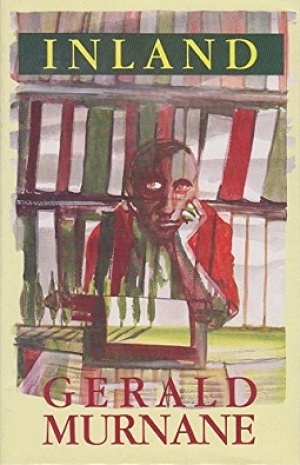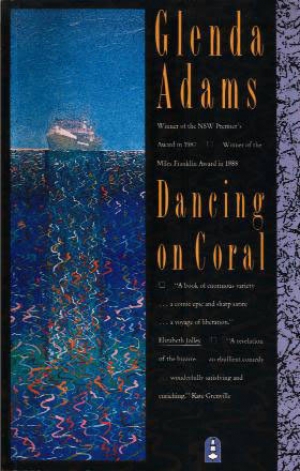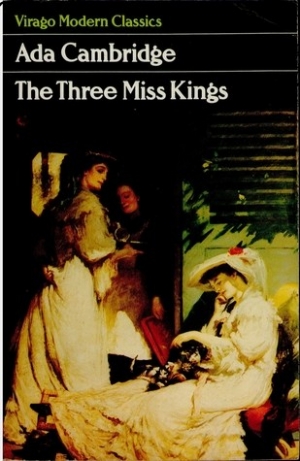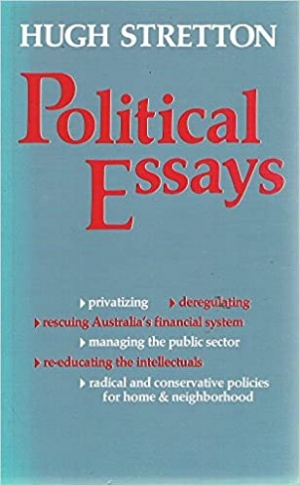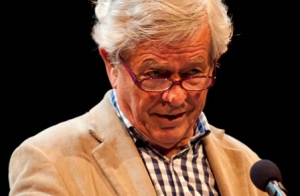Archive
Some of the narrators of Gerald Murnane’s novels and stories tend to view oceans and coastlines with the fear and loathing of flat earth believers. Just the whiff of the sea breeze is enough to spoil the day for them, the grit and the glare of sun-touched sand distresses them and they speak with contempt of the ‘idiot noise’ of the sea and of those who swim and play in the waves and on the beaches. Seaside holidays, they imply, are for frivolous people stupidly turning a blind eye to the ocean’s treachery – its dark moods, its black holes, and its sinister capacity to gnaw at and dissolve something as solid as rock.
... (read more)Elizabeth Jolley reviews 'Dancing on Coral' by Glenda Adams
A mixture of courage and an innocent hopefulness seem to be the necessary ingredients for finding rewards and compensations during the painful searching after self-knowledge. Lark Watter, the student daughter of Henry and Mrs Watter, embarks, as so many do, on the voyage of self-discovery.
... (read more)Helen Thomson reviews 'The Three Miss Kings' by Ada Cambridge and 'The Invaluable Mystery ' by Leshia Harford
These two very different novels by women provide a wealth of suggestive information about the women’s history being reclaimed and re-established by Australian feminists. They also happen to be intrinsically good novels, accomplished and charming in contrasting ways. Add Cambridge’s The Three Miss Kings, reprinted in the Virago Modem Classics series, was first serialised in 1883 in The Australasian, published in novel form in 1891, and soon became one of Cambridge’s most popular novels. It draws upon the familiar form of the romance, but it also, in its translation into an Australian setting, illuminates an idiosyncratic colonial grafting onto that form.
... (read more)On Bertrand Russell’s ninetieth birthday, the Daily Express published a congratulatory leader, which described him as ‘an intellectual gadfly on the rump of British society’. Moreover, to demonstrate that this most conservative of British newspapers intended no insult, the leader went on to describe Russell as ‘the second greatest living Englishman’ after Winston Churchill. Australia’s record of producing, much less recognising the achievements of, intellectual gadflies is if anything worse than Britain’s. The only figure of real stature who might qualify for that title is Hugh Stretton, an academic with an unerring talent for tearing the veils of pretension from the ideas and practices we most take for granted. Since this epoch, as much as any other, needs to take a mirror to its real rather than its pretended self, this too is intended to be anything but insulting.
... (read more)K.K. Ruthven reviews 'Criticism in Society' by Imre Salusinszky
Living with Stress and Anxiety is the title of one of those self-help guides put out by Manchester University Press in its ‘Living With …’ series; Living with Breast Cancer and Mastectomy is another. Living with Literary Theory is not a scheduled volume, I imagine, although some people who work in the lit. crit. business seem to regard literary theory as a prime source of anxiety for which the only remedy is theorectomy. In the decade since Terence Hawkes first taught us how to live with Structuralism and Semiotics (1977), Methuen has succeeded admirably through its expository ‘New Accents’ series (edited by Hawkes) in making it easier for everybody to cope with such anxiety-provoking processes as Lacanian psychoanalysis or Derridean deconstruction; too easy, in the opinion of those who them-selves feel uneasy at the politics of marketing criticism’s nouvelle cuisine as fast-food takeaways, with Methuen playing the role of the big M.
... (read more)Kevin Hart reviews 'Crossing the Gap: A novelist’s essays' by C.J. Koch
Many of our strongest writers are also numbered among our most commanding critics; and in some cases – Dryden, Johnson, Coleridge, and Eliot – it is not easy to tell whether their greater contribution is to literature or literary criticism. Part of the problem, of course, is that at this high level the distinction tends to break down: criticism becomes literature in its own right and often on its own terms.
... (read more)Stephen Knight reviews 'Right words: A guide to English usage in Australia' by Stephen Murray-Smith
If, as Dr Johnson opined, a lexicographer is a harmless drudge, what does that make a lexicographical reviewer? A potentially harmful drudge perhaps. Who else feels the need to consume a dictionary whole in one indigestible sequence?
... (read more)Writing is what I love doing. There is almost nothing like it. Even playing two or three close sets of tennis will not quite compete with having a good poetic theme discover you, and then managing to nut it out, to make it chime like a bell. No wonder the French critics are so fond of talking about the jouissance of a text. When a poetic shape-and-theme I’ve been struggling with comes good, it comes like an express train. And, whether painful or pleasing, writing has become an absolute necessity, so that I grow fretful, grumpy, zany, if I haven’t written anything decent for several days.
... (read more)Margaret Dunkle reviews 'The Lonely Hearts Club' by Robin Klein and Max Dann
Miracles can still happen. Robin Klein and Max Dann, two of the most popular and successful contemporary children’s authors, have combined forces to write a comedy with a boarding school setting which might, just possibly, start a whole new trend in Australian children’s literature.
... (read more)Jill Roe reviews 'The Limits of Hope: Soldier settlement in Victoria 1915–1938' by Marilyn Lake
‘The settlement of returned soldiers on cultivable land,’ wrote Ernest Scott in Volume XI of the Official History of Australia in the War 1914–1918 (1936), ‘is one of the most ancient policies of governments after wars.’ Soldier settlement in Australia after World War I is a major instance of a practice dating back as far as Assyria in the thirteenth-century BC. In early twentieth-century Australia, the need to raise an army entirely from volunteers, and the insatiable demands of modern war, made soldier settlement as much an inducement of recruitment as a means of calming things down afterwards, its traditional function.
... (read more)
